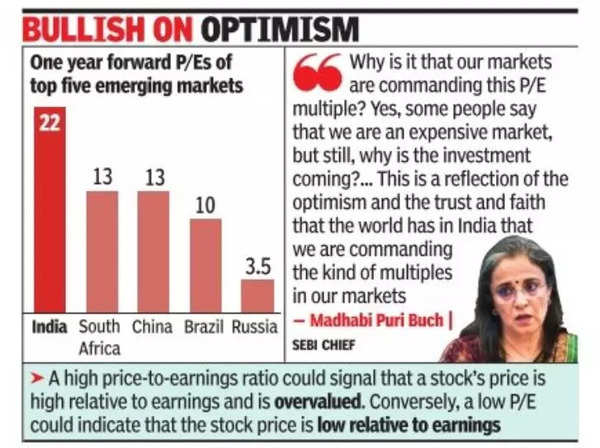The regulator chief’s comments come on the back of her observations in March that some market segments had “pockets of froth”.Her statements on valuations and signs of manipulations in some segments last month led to a correction in small-cap stocks.

In late Jan, India overtook Hong Kong to emerge as the fourth-largest stock market based on value of shares. There has been some commentary on valuations of Indian stocks being high. A high P/E ratio could signal that a stock’s price is high relative to earnings and is overvalued. Conversely, a low P/E could indicate that the stock price is low relative to earnings.
“Why is it that our markets are commanding… this price-to-earning multiple, which is higher than not only the averages of the world indices but also when compared with various nations at 22.2? Yes, some people say that we are an expensive market, but still, why is the investment coming?” Buch said at CII’s 17th annual corporate governance summit. She added that this was a “reflection of the optimism and the trust and faith that the world has in India today that we are commanding the kind of multiples in our markets”.
The market regulator said direct and indirect tax collections and energy consumption data indicated the economy’s momentum. GST collections — which started at an average of Rs 1 lakh crore a month — have risen to around Rs 1.7 lakh crore today, and the increase is illuminating for global investors, she said. According to Buch, these growth numbers have manifested in the markets and resulted in a “hockey-stick effect”.
“If you see the way the market cap has grown from Rs 74 lakh crore to one time the GDP now — the growth has been phenomenal in 10 years. India’s weight in the emerging markets index has increased from 6.6 to 16.6,” she said.
We also published the following articles recently
Maruti Suzuki India’s shares surged 4% to Rs 12,722.70, boasting a market cap of Rs 4 lakh cr on NSE, alongside top stocks like Reliance, TCS, HDFC Bank, Bharti Airtel, SBI, Infosys, LIC, ITC, HUL.”}
Unified Payments Interface (UPI) transforms India’s digital landscape, catalyzing job creation and economic growth. From reshaping payment ecosystems to bolstering cybersecurity defenses, UPI’s impact on financial inclusion and empowerment is profound and far-reaching.

